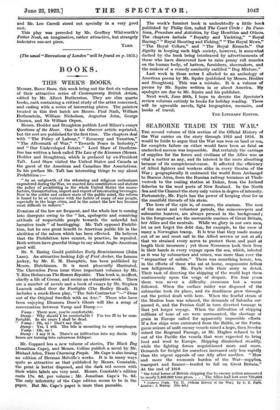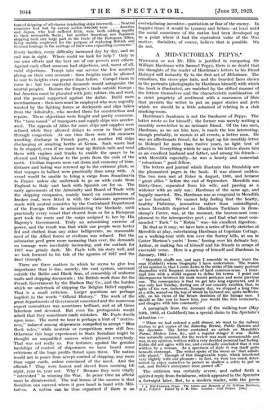SEABORNE TRADE IN THE WAR.*
Tan second volume of this section of the Official History of the War carries on the story through 1915 and 1916. It would be futile to argue that the War was won on land or sea, for complete failure on either would have been as fatal as unchecked success was impossible. But certainly the carriage of supplies for the forces and civilians of the Allies was as vital a matter as any, and its interest is the more absorbing because of its comprehensiveness. It affected the efficiency of Allied fighters and workers alike in every theatre of the War ; geographically it embraced the world from Archangel to Buenos Aires, from the Russian railway terminus at Vladi- vostock to the coaling station at Dakar, from the Iceland fisheries to the wool ports of New Zealand. In the North Sea and the Channel the story only varies in degree of intensity. Fortunately, Mr. Fayle has the power of keeping clear for us the manifold threads of his skein.
The hero of the epic is, of course, the seaman. The men of the naval and volunteer patrols, the minesweepers and submarine hunters, are always present in the background t in the foreground are the mercantile marines of Great Britain, her Allies and the neutrals. While we glory in our own men, let us not forget the debt due, for example, to the crew of many a Norwegian tramp. It is true that they made money out of us and must sail in the Allied service or not at all; that we strained every nerve to protect them and paid al length their insurance ; yet those Norsemen took their lives in their hands in every voyage upon the sea, which, infested as it was by submarines and mines, was more than ever the " stepmother of sailors." There was something heroic, too, in the efforts of those who sat at home, cauponantes bellum non belligerentes. Mr. Fayle tells their story in detail. Their task of directing the shipping of the world kept them continuously upon the verge of despair. For four years there was never a difficulty overcome but a worse followed. When the surface raider was disposed of the submarine took its place, and its deadliness grew through. out the period dealt with here. When the fearful strain of the Mudros base was relaxed, the demands of Salonika sur- passed it, and the Persian Gulf in turn diverted tonnage to that yet longer voyage. When the difficulties of shipping millions of tons of ore were surmounted, the shortage of grain in Europe called for apparently impossible efforts.
If a few ships were extricated from the Baltic, or the Porta, guese seizure of unfit enemy vessels raised a hope, then Sweden
mined the Kogrund Passage, or Mr. Hughes refused to lel out of the Pacific the vessels that were expected to bring food and wool to Europe. Shipping diminished steadily, while the fighting forces requisitioned more and more. Demands for freight for ourselves increased only less rapidly than the urgent appeals of one Ally after another. " Moro and more the economic burden of the War—supplies, transport and finance—tended to fall on Great Britain." At the end of 1916 " the total losses of British shipping due to enemy action amounted to nearly 2,400,000 tons gross. . . . The Allies had lost over 780,000
• Seaborne Trod*. Vol. II. (Official History of the War.) By C. B. inftn• London : J. Murray. (21s. net.)
tons of shipping of all classes (excluding ships interned).... Neutral countries had lost by enemy action 840,000 tons. . . . America and Japan, who had suffered little, were both adding rapidly to their mercantile fleets ; but neither American nor Japanese shipping took any large part in the trade of the European Allies, being mainly employed for the purpose of replacing British and German tonnage in the carriage of their own expanding commerce."
Every burden, every difficulty increased day by day, and no end was in sight. Where could we look for help ? Only to our own efforts and the best use of our powers over others. Against each effort someone had objections, and, worst of all, valid objections. Tempt into our service the few neutrals plying on their own account : then freights must be allowed to soar to heights even greater than before. Compel them to come in : but too masterful demands would antagonize the neutral peoples. Reduce the Empire's trade outside Europe : but America must be placated with jute, rubber, tin and wool, and the pound supported against the dollar. Build more merchantmen : then men must be employed who were urgently wanted by the fighting forces or dockyards and slips taken from the Admiralty, who needed them for construction and repairs. These objections were fought and partly overcome. The " turn round " of transports and supply ships was acceler- ated. The appeals of Allies for more ships and supplies were refused while they allowed delays to occur in their ports through congestion. At one time there were 180 steamers awaiting discharge in French ports, at another 102 ships discharging or awaiting berths at Genoa. Such waste had to be stopped, even if we must tear up British rails and send them with engines and trucks to enable the quays to be cleared and bring labour to the ports from the ends of the earth. Civilian imports were cut down and economy of time, distance and lading was screwed up to the extreme pitch, so that voyages in ballast were practically done away with. A vessel would be unable to bring a cargo from Scandinavia
to France unless she undertook to go on with coals from
England to Italy and back with Spanish ore for us. The early agreements of the Admiralty and Board of Trade with the shipping companies, mainly based on consideration of bunker coal, were fitted in with the elaborate agreements made with neutral countries by the Contraband Department of the Foreign Office in administering the blockade, until practically every vessel that cleared from or for a European port took the route and the cargo assigned to her by His Majesty's Government. Truly an astonishing exercise of power, and the result was that while our people were better fed and clothed than any other belligerents, no reasonable need of the Allied forces or civilians was refused. But the submarine peril grew more menacing than ever, the demands on tonnage were inevitably increasing, and the outlook for 1917 was grimly dark. Mr. Fayle tells his story well, and we look forward to his tale of the agonies of 1917 and the final triumph.
There are three matters to which he seems to give less importance than is due, namely, the vast system, universal outside the Baltic and Black Seas, of censorship of seaborne mails and shipping documents ; the British work done for the French Government by the Hudson Bay Co., and the burden which we undertook of shipping the Belgian Relief supplies. That is a small criticism. Larger questions are perhaps implicit in the words " Official History." The work of the great departments of Government concerned and the numerous expert committees was sometimes brilliant, and at all times laborious and devoted. But even the protagonists would admit that they sometimes made mistakes. Mr. Fayle dwells upon none. The worst we hear is perhaps a hint of " restive- ness," induced among shipowners compelled to accept " Blue Book rates," while neutrals or competitors were still free.
Otherwise this huge experiment in State Socialism might be thought an unqualified success which pleased everybody. That was not really so. For instance, against the genuine hardships of control of shipowners we have heard some criticisms of the huge profits thrust upon them. The nation would not in peace time accept control of shipping, any more than sugar cards, unless convinced of the need. And the officials ? Thy were honest and slaved from morning till night, year in, year out. Why ? Because they were vitally " interested " in winning the War. In peace time an official must be disinterested. The real lesson of the success is that Socialism can succeed where it goes hand in hand with Mili tarkm. A nation can be thus organized if there is an
overwhelming incentive—patriotism or fear of the enemy. In happier times it would be tyranny and failure—at least until the social conscience of the nation had been developed up to a point where it had the equivalent value of the War motive. Socialists, of course, believe that is possible. We do not.











































 Previous page
Previous page